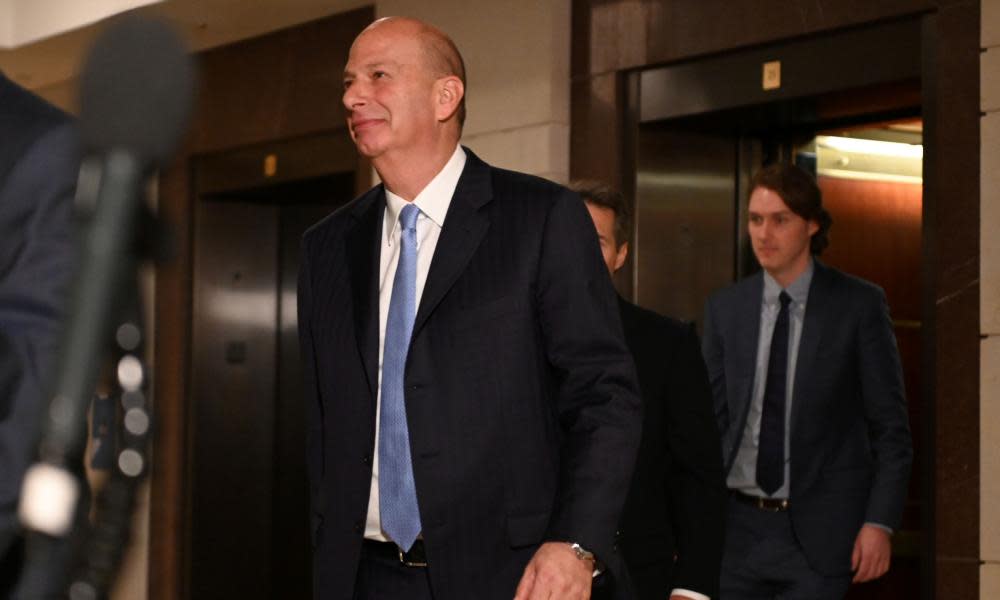Impeachment inquiry: Trump ally must choose between loyalty and saving himself

Donald Trump’s fate in the impeachment inquiry could rest in the hands of a donor and supporter under pressure to turn against the US president to save his own skin.
Gordon Sondland, the American ambassador to the European Union, is due to testify on Wednesday during the second week of televised hearings that have rocked the White House.
Sondland is certain to be questioned about the biggest revelation from last week: a phone call he made to Trump from Ukraine in July in which the president was overheard asking about an investigation into one of his political rivals. Sondland allegedly assured him it would go ahead.
The ambassador made no mention of the call in a deposition to the inquiry behind closed doors, nor in a revised statement three weeks later that conceded a quid pro quo over military aid. Now, in front of TV cameras and an audience of millions, he will be asked why.
As he weighs his answer, Sondland may try to balance fealty to Trump with the fate that has befallen others in the president’s circle: his former lawyer Michael Cohen and ex-campaign chairman Paul Manafort are both behind bars, while political operative Roger Stone was last week found guilty of lying to Congress.
“Hey Ambassador Sondland,” tweeted Joe Scarborough, a former congressman turned TV host, “Roger Stone lied to Congress for Trump and is now going to jail. Just like his campaign manager and lawyer. Are you next? Your call, Gordy.”
Washington has been gripped by only the fourth impeachment inquiry in American history. Last week, in the first public hearings, three senior officials – Bill Taylor, George Kent and Marie Yovanovitch – presented a damning account of how Trump smeared his own diplomats so he could establish an irregular channel to bribe Ukraine and boost his chances in next year’s presidential election.
But the president remained defiant and there were few cracks in the defensive wall erected by Republicans and conservative media.
Sondland, however, could prove pivotal. The hotelier and Republican fundraiser had an on-off relationship with Trump during the 2016 presidential election campaign but came on board with a $1m through his companies to his inaugural committee. Sondland was appointed US ambassador to the EU and moved to Brussels last year.
On 10 July this year, a White House meeting with Ukrainian officials ended abruptly when Sondland said he had an agreement with Mick Mulvaney, the acting White House chief of staff, that Ukraine’s president Volodymyr Zelenskiy would get a meeting with Trump if Ukraine agreed to open investigations.
John Bolton, then national security adviser, was appalled, the inquiry has heard, and remarked: “I am not part of whatever drug deal Sondland and Mulvaney are cooking up on this.”
Military aid to Ukraine was frozen until further notice. On 25 July, Trump spoke to Zelenskiy by phone, pressing him for help in gathering potentially damaging information about former vice-president Joe Biden, a potential challenger in next year’s presidential election.
On 26 July, Trump spoke by phone with Sondland while the ambassador was in a restaurant in Kiev. Last week Taylor, the top US diplomat in Ukraine, told the inquiry that one of his staff overhead parts of the conversation, in which Trump referred to “the investigations”.
After the call, the staff member asked Sondland what Trump thought about Ukraine. “Ambassador Sondland responded that President Trump cares more about the investigations of Biden, which [his personal lawyer Rudy] Giuliani was pressing for,” Taylor testified.
Republicans dismissed Taylor’s account as hearsay and Trump told reporters after the hearing that he knew “nothing” about the call with Sondland. The staff member cited by Taylor was David Holmes, who testified in private on Friday.
A copy of Holmes’s opening statement, first obtained by CNN, said: “Sondland told Trump that Zelenskiy ‘loves your ass’. I then heard President Trump ask, ‘So, he’s gonna do the investigation?’ Ambassador Sondland replied that ‘he’s gonna do it,’ adding that President Zelensky will do ‘anything you ask him to’.”
With Republicans seeking to portray every allegation as based second or third hand sources, Democrats are sure to press Sondland on this direct conversation with the president and ask why he omitted it from his earlier evidence.
Matthew Miller, former chief spokesperson for the justice department, said: “I think Sondland’s testimony is incredibly important because if you look at his last appearance before the committee in private, it seems pretty clear he was withholding facts on a number of occasions. He claims to not remember conversations that it was implausible for him to forget.”
Sondland told the committee that he never discussed investigating Biden with anyone at the White House or state department, Miller noted. “Now you have this reported conversation where he gets off the phone and says to a staffer that Biden is the most important thing. If that’s true, he just clearly lied to the committee. That is as clear cut a lie as you can catch someone in.”
The consequences for Sondland could be dire if he maintains blind loyalty to Trump. Miller, now a partner at management consultancy Vianovo, added: “If I was him, I would be very worried about a referral to the committee for a criminal charge and I would be trying to get on the right side of the committee to prevent that happening. The committee now has a lot of leverage over him to get him to tell the truth.
Related: Trump personally kept pressure on Ukraine, says impeachment inquiry witness
“Throughout the Mueller inquiry [into alleged collusion with Russia], there were a lot of witnesses who thought they could stick with Trump and get a pardon. Paul Manafort and Michael Cohen are now in prison and Roger Stone has just been convicted. So that’s a pretty dangerous gamble to make.”

